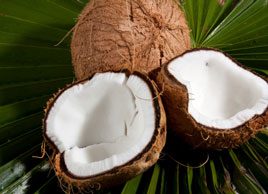Ask Best Health: Is coconut oil safe?
Not sure about the health claims of coconut oil? Find out whether it’s safe cooking ingredient for you

Source: Web exclusive, August 2011
Coconut oil is becoming an increasingly popular cooking ingredient. It’s beginning to appear on mainstream grocery store shelves and it won’t be long before you’re tempted to cook with it yourself. But if you think you recall hearing some health concerns about coconut milk or oil’you probably did. It (and palm oil) contain the highest saturated fat of all plant-based oils (think olive, corn and safflower oils), according to Linda Kennedy, registered dietitian with FitNut Consulting in Calgary, Alta. Remember, too much saturated fat can raise LDL-cholesterol (‘bad’ cholesterol) levels. So here’s what you need to know before you add this oil to your grocery list.
What is coconut oil?
Coconut oil is extracted from the meat of the coconut. In tropical regions of the world, it is a primary source of fat. Because it is heat stable (has a high smoke point), it makes an excellent cooking and frying oil, adds Nicole Fetterly, a registered dietitian in Vancouver.
Virgin coconut oil is a very ‘clean’ oil, according to Kennedy. ‘The way a lot of other plant-based oils are refined leaves them laden with chemicals. For example, producers use bleach to create that nice clear oil appearance we appreciate. All the processing then requires the addition of deodorizers.’
Supporters of coconut oil contend that it contains a number of health benefits including antimicrobial effects, which inhibit the growth of bacteria, as well as potential heart health benefits. They say that coconut meat, milk and oil have nourished populations around the world for generations.
So why the controversy?
Coconut oil is composed of medium-chain fatty acids or triglycerides (unlike most fats in our diets which are long-chain). ‘The medium-chain fatty acids are more easily processed by our bodies,’ says Kennedy. But she adds that the jury is out on whether it has a beneficial effect on cholesterol. Any other therapeutic claims made by coconut oil enthusiasts are not backed by science, she says.
One thing everyone seems to agree on is that the use coconut oil in processed foods, such as crackers, cookies and nondairy creamers, is bad for you. The process of hydrogenating the fat turns it into a trans fat, which definitely up your risk for heart disease.
Bottom line
Most health organizations, including the Canadian Heart and Stroke Foundation and the United States Food and Drug Administration agree that saturated fats should be limited in our diets and kept to less than 10 percent of our daily total calorie intake. For an average woman, that works out to about two to four teaspoons a day. Kennedy points out that those teaspoons need to include all the hidden fats you might be consuming.
‘If you’re going to include coconut oil in your diet, it absolutely must be 100 percent, cold-pressed,’ she says. ‘Use it in moderation and be cautious, like you should be with any saturated fat.’
Don’t miss out! Sign up for our free weekly newsletters and get nutritious recipes, healthy weight-loss tips, easy ways to stay in shape and all the health news you need, delivered straight to your inbox.




